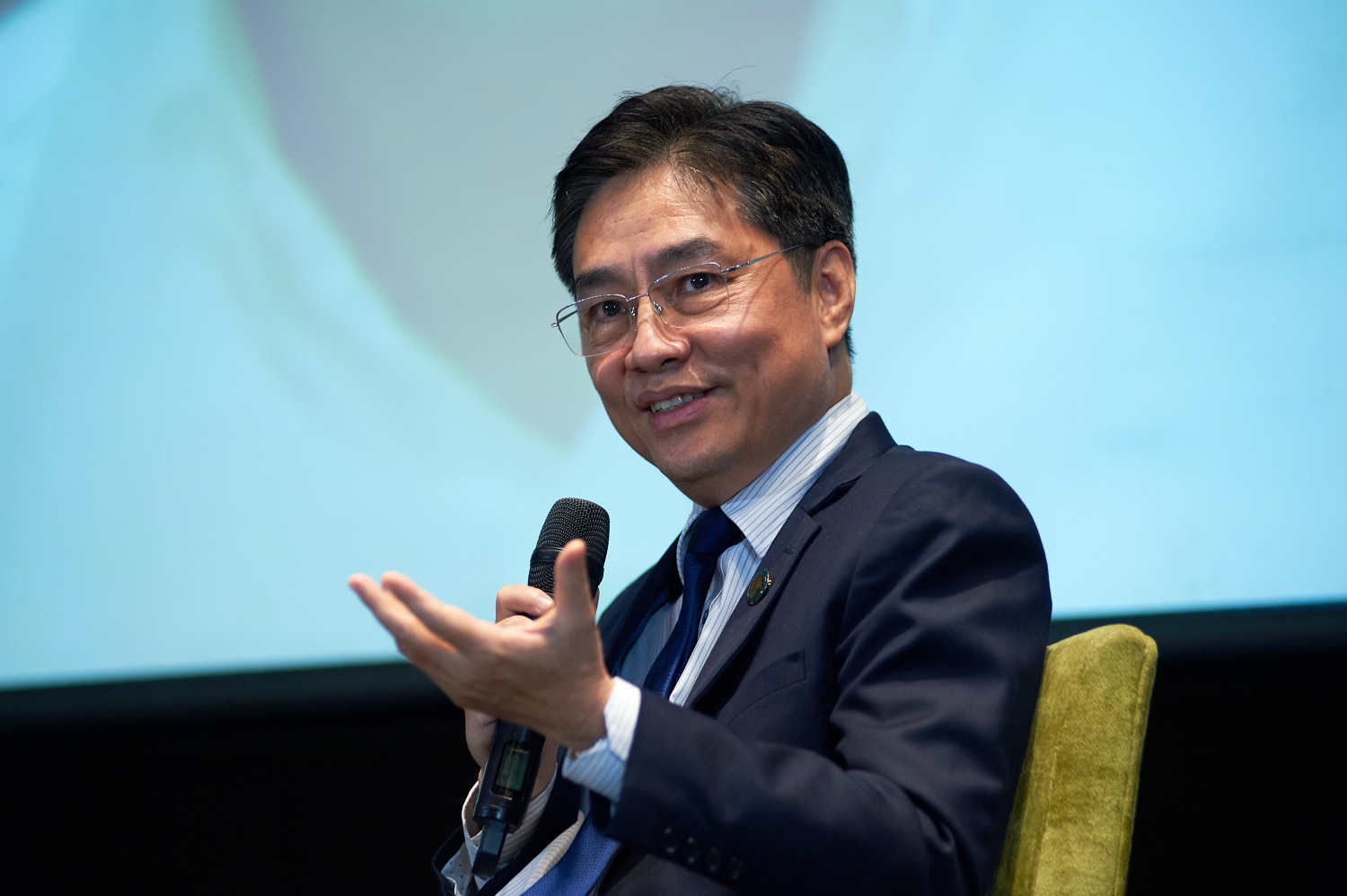Industry Insights Session is part of Vietcetera’s Vietnam Innovators Summit program. The fourth Industry Insight Session focused on the current status of the healthcare sector in Vietnam and the emerging trends pushing the industry forward — highly relevant topics as the country (and the world) takes steps towards the post-pandemic new normal. Moderated by Hawkins Pham, General Partner of Viet Capital Healthcare Fund, the session was made possible by industry leaders David Duong, MD, MPH, Professor Tran Diep Tuan, Vu Vuong, Raghu Rai, Minh Nguyen, Lucy Setian, Janice Trinh, and Tran Quoc Dung.
Truth be told, Vietnam’s healthcare system is not the best in the world, nor the Southeast Asian region. With only seven doctors per ten thousand patients, the local healthcare sector has a lot of hurdles to overcome before it can give quality service to the Vietnamese people. These problems have persisted for decades, but it was only during the COVID-19 pandemic that the challenges of a very significant sector were highlighted.
At the fourth Industry Insights Session hosted by Vietcetera as part of its Vietnam Innovators Summit program, leaders of the healthcare sector and medical professionals discussed the current status of the healthcare sector, the challenges hindering its progress, and the emerging trends pushing it forward.
Changing traditions, mindsets
The World Health Organization reported that Vietnamese hospitals struggle with “weak management, long waiting periods, poor quality and safety, and low patient satisfaction, which impair hospital performance.” Not to mention that because most hospitals have existed for a long time, traditional practices remain prevalent, making it hard for new medical trends, technologies, and procedures to penetrate.
For Professor Tran Diep Tuan, Chairman of the Board of the University of Medicine and Pharmacy in Ho Chi Minh City, the first step to upgrading the medical system is to develop a modern education model that answers the current needs of both patients and physicians.

“The medical education we have has existed for 100 years, getting through three generations of patients. We’ve been following the Princeton Flexner report, but this is a very old model. We thought that we needed to change the way we train people.”
But recognizing the problem and wanting to solve it isn’t quickly followed by actual change, according to Professor Tuan. The biggest challenge was the mindset of the people involved. While the University of Medicine and Pharmacy-HCMC (UMP) is one of the most reputable medical institutions in Vietnam, it is also one of the oldest.
“I would say that the more traditional the university or an organization is, the more difficult it is to change. People believe we already have this good governance and a good system, so why do we need to change? That’s the first question we need to answer,” the professor explained.
With UMP offering a quality learning avenue for more than 15,000 students — from dentistry to midwifery and medical technology — its role in shaping Vietnam’s future medical professionals is massive as it is critical. Under his leadership, Professor Tuan demonstrated a solid commitment to innovation in medical education, which led UMP to become an internationally recognized institution.
Professor Tuan’s passion for transforming Vietnam’s healthcare system pushed Harvard-educated David Duong, MD, MPH, to look into his homeland’s medical sector. David helped develop the country's capacity for high-quality medical education, research, and healthcare through the Partnership for Health Advancement in Vietnam (HAIVN).

In collaboration with Harvard Medical School (HMS) and two HMS-affiliated teaching hospitals, HAIVN supports the local health system through medical curriculum innovation and supporting the health ministry to develop policies that support quality medical education and medical care.
“...our role as an international partner is to be there with our colleagues [in Vietnam] as they go through this change and to really accompany them and walk with them hand-in-hand because you can drop innovation or an idea from a global perspective. But if you don't work with your partners to be able to think about how to adapt it to the local context, how to apply it in a local context, it might not have a big impact,” said David.
Healthcare consumerization
Healthcare consumerization, by definition, is a shift in the industry focus on the individual consumer rather than the market as a whole. Industry players, particularly private medical firms, give consumers more influence and control over the medical care they need and want. This trend, driven by higher digital expectations and more active demands of the younger generations, has pushed small and big industry players to be consumer-focused.
Jio Health, an online healthcare platform, has significantly contributed to “humanizing” healthcare for Vietnamese patients. With an omnichannel ecosystem that makes doctor appointments, medical consultations, pharmacy, and other care services easily accessible and affordable, Jio Health has empowered Vietnamese to seek quality care.

“The consumers [in Vietnam] are somewhat sensitized towards paying for their healthcare,” said Raghu Rai, Founder and CEO of Jio Health. “There were obvious challenges regarding the technology that needed to be provided to upgrade the care experience. But we also felt that not only could we be a technology platform, but we could potentially undertake the enormous task of becoming a care provider.”
Thuocsi.vn, another leading healthcare platform in Vietnam, is also on a mission to build customer-centric health ecosystems. Thuocsi.vn’s focus is on pharmaceuticals — creating a beneficial relationship between pharmaceutical manufacturers, distributors, pharmacists, and customers.

“Growing up, I saw a lot of inefficiency in how we do healthcare in Vietnam. So I wanted to make medicines more sensible and affordable for every patient in the country,” shared Vu Vuong, co-founder at thuocsi.vn. “The main problem was the affordability and having a wide variety of medical products. We’re trying to solve that as I saw that that needed to be addressed.”
For a multinational pharmaceutical firm like Pfizer, the nature of how Vietnam’s healthcare system functions impact other sectors and stakeholders. Considering that the sector is primarily government-owned and regulated, a close collaboration with the private sector is the only way to really reach Vietnamese in all corners of the country.

“Public and private partnerships for healthcare started just five years ago. But I have seen some progress. To achieve more progress in this area, we can calibrate the resources from both public and private healthcare providers. Public hospitals can share their experiences and knowledge with emerging private sectors and vice versa,” explained Minh Nguyen, Category Lead - Hospital Business Unit of Pfizer Vietnam.
Digital healthcare trends
Like anywhere else, even in advanced nations, the healthcare industry in Vietnam is one of the last industries to move fully into the digital age. Health and technology hardly meet in the same space, admitted Lucy Setian, Director of Digital Transformation at Novartis Foundation – a Swiss non-profit organization aiming to improve the health of low-income populations.

But it is an inevitable move. Medical innovations have transformed people’s lifestyles, prolonged lives, and improved overall health. Making these innovations available in Vietnam, though, is another story. Novartis works with local authorities, health departments, private companies, and organizations to deliver transformative digital health services in urban and rural Vietnam. It has brought innovative solutions for disease screening and treatment, especially for cardiovascular risks among Vietnamese elders, at the community level, leveraging digital health technologies.
This is also the mission of Ominext Group, a Vietnam-based one-stop provider for healthcare and medical systems. Having developed industry-leading digital healthcare systems in the last ten years for the Japanese market, Ominext introduced a Value-based approach to digital health in Vietnam — something still relatively unfamiliar to the general healthcare model. Using the power of information technology. Ominext has created a system that made medical digital transformation easier and faster, which in turn, made healthcare more accessible to those who need it — without all the necessary hullabaloos that currently exist.

“One of the main problems of the current medical system is the lack of Alternative-Payment-Models (APMs) in contrast to the existing Fee For Service (FFS) payment models, which means that the more tests were taken, the more income a hospital gets. It’s very easy to see that a lot of unnecessary tests have been given, and the patients have to pay for all of them — they see this long list in their bills but don’t really know the value,” said Tran Quoc Dung, Founder and CEO of Ominext Group.
“Having lived in Japan for more than ten years, I saw the ways healthcare IT was used in Japan. I wanted to contribute something to the Vietnamese medical system. It was part of my dream to make primary care infrastructure here, for example, starting with pharma as the first station for healthcare.”
More than 7000 medical facilities and 3000 pharmacies have adopted Ominext, said Tran. “Our innovative solutions make a clear healthcare plan where we maximize the outcomes and minimize expenditures. With the support of information technology, medical institutions can measure all health data. They can calculate and evaluate these data and then talk to the patients about improving their health.”

But for all these digital innovations to truly take off and be embraced fully by all industry players and stakeholders, financial capital is much needed. This is where Quadria Capital comes in. One of the largest healthcare-focused private equity funds in Asia, Quadria Capital does not just provide capital but expertise and a quality control network ecosystem to reinforce the sector and help it scale faster.
“We are seeing a lot of changes in this sector — from where patients get treated to how they get treated and everything that happens in between. I would say that [healthcare] is a changing business model, but it’s changing in terms of technological adoptions,” explained Janice Trinh, VP at Quadria Capital.
“We foster conversations between our portfolio companies in different parts of the world to share how exactly they’re going to do it and how they would manage quality funding to ensure the patients they’re servicing receive proper care on time.” Quadria has invested in FV Hospital and Con Cung.
More photos from the Industry Insights Session: Prescription for Healthcare in Vietnam:










